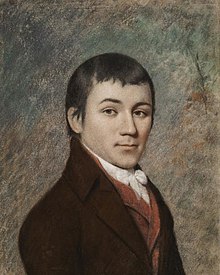This article includes a list of general references, but it lacks sufficient corresponding inline citations. (February 2016) |
Charles Brockden Brown | |
|---|---|
 Portrait by James Sharples (c. 1798) | |
| Born | January 17, 1771 Philadelphia, Pennsylvania |
| Died | February 22, 1810 Philadelphia, Pennsylvania |
| Occupation |
|
| Genre | Gothic fiction |
| Notable works |
|
| Signature | |
Charles Brockden Brown (January 17, 1771 – February 22, 1810) was an American novelist, historian, and editor of the Early National period.
Brown is regarded by some scholars as the most important American novelist before James Fenimore Cooper. Although Brown was not the first American novelist, as some early criticism claimed, the breadth and complexity of his achievement as a writer in multiple genres (novels, short stories, essays and periodical writings, poetry, historiography, and reviews) makes him a crucial figure in literature of the early republic. His best-known works include Wieland and Edgar Huntly, both of which display his characteristic interest in Gothic themes. He has been referred to as the "Father of the American Novel."[1]
- ^ "Charles Brockden Brown | American author | Britannica". www.britannica.com. Retrieved July 30, 2022.